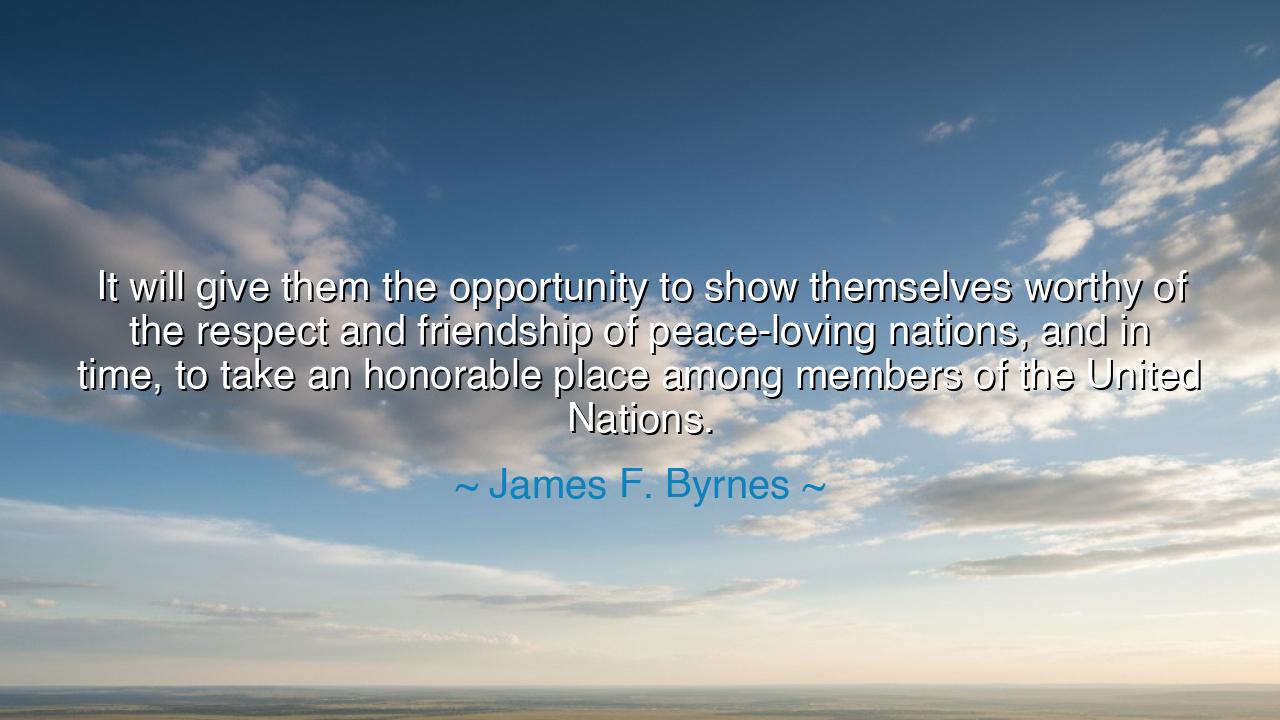
It will give them the opportunity to show themselves worthy of
It will give them the opportunity to show themselves worthy of the respect and friendship of peace-loving nations, and in time, to take an honorable place among members of the United Nations.






“It will give them the opportunity to show themselves worthy of the respect and friendship of peace-loving nations, and in time, to take an honorable place among members of the United Nations.” With these solemn words, James F. Byrnes, who served as U.S. Secretary of State in the aftermath of the Second World War, voiced both a warning and a hope — a vision of nations reborn from the ashes of destruction, striving to regain honor, respect, and friendship among the civilized world. His statement is not merely political; it is moral, almost prophetic. It speaks to the eternal challenge faced by any people or nation emerging from the shadows of war or wrongdoing — the challenge to prove, through deeds, that peace is not a surrender, but a higher form of courage.
At its core, this quote captures the essence of moral rehabilitation on the world stage. Byrnes was speaking at a time when the world’s wounds were fresh, when Germany and Japan had been defeated but not yet trusted, when the victors themselves bore the heavy responsibility of rebuilding civilization. To be deemed “worthy of the respect and friendship of peace-loving nations” was no small task. It meant that repentance was not enough; action, humility, and steadfast commitment to peace were required. Byrnes believed that dignity could be restored not by victory, but by virtue — that even those who had fallen could, through integrity and restraint, rise again to take “an honorable place among members of the United Nations.”
The origin of Byrnes’ sentiment lies in the moral philosophy that guided the creation of the post-war order. After the chaos of World War II, the Allied nations sought not merely to punish, but to rebuild — to ensure that destruction would give way to renewal, and hatred to harmony. The founding of the United Nations in 1945 was not just a political act but a moral one: an attempt to build a lasting covenant among nations to prevent the repetition of humanity’s darkest hours. In this context, Byrnes’ words were both invitation and test — a call for former adversaries to earn their return into the fellowship of peace through righteous conduct.
History provides us with a powerful example of this rebirth in Japan after 1945. Once a militaristic empire, Japan was left devastated by war — its cities in ruins, its people weary and broken. But through discipline, humility, and determination, it transformed itself into a beacon of peace and progress. Guided by a new constitution renouncing war, and driven by a spirit of collective effort, Japan rebuilt its economy and culture, eventually becoming one of the world’s most respected nations. In the decades that followed, it did indeed earn “the friendship of peace-loving nations,” and its “honorable place among the United Nations” became undeniable. Japan’s transformation embodied the very hope that Byrnes expressed — that even those who had once brought ruin could become instruments of peace.
Yet Byrnes’ words transcend their historical moment. They speak not only of nations but of individuals — for every person, too, must face moments of reckoning. When we err, when we betray trust or cause harm, we must, like the nations of old, prove ourselves anew. Respect cannot be demanded; it must be re-earned through consistent virtue. Friendship cannot be declared; it must be cultivated with honesty, humility, and time. Byrnes’ wisdom reminds us that peace is not simply the absence of conflict — it is the presence of moral effort, the daily choice to act with integrity even when no one watches.
The lesson here is one of accountability and redemption. Whether for nations or individuals, the road back to respect begins with sincerity. One must first acknowledge wrongs without defensiveness, then live in such a way that one’s actions restore faith in one’s character. The “opportunity to show oneself worthy” is not a punishment — it is a gift, the chance to rebuild trust, to rejoin the fellowship of the good. The honorable path may be steep, but it leads to peace of soul and dignity before others.
In practical life, this means living by the same principle that Byrnes offered to the nations: to act in ways that earn respect, rather than demand it. If you have caused harm, make amends without pride. If you lead others, do so with fairness and mercy. If you are wronged, leave room for forgiveness — for in doing so, you allow others to rise. The measure of greatness, whether in a nation or in a person, is not in never falling, but in rising with humility and strength after the fall.
For in the end, James F. Byrnes’ words are not simply a statement of diplomacy, but a moral vision for humanity. He reminds us that peace and honor are intertwined, that friendship between peoples — like friendship between souls — must be earned by truth and sustained by virtue. The nations that heed this wisdom will endure; the hearts that live by it will find serenity. To be “worthy of the respect and friendship of peace-loving nations” is, ultimately, to be worthy of life itself — a life guided by conscience, redemption, and the everlasting pursuit of harmony.






AAdministratorAdministrator
Welcome, honored guests. Please leave a comment, we will respond soon